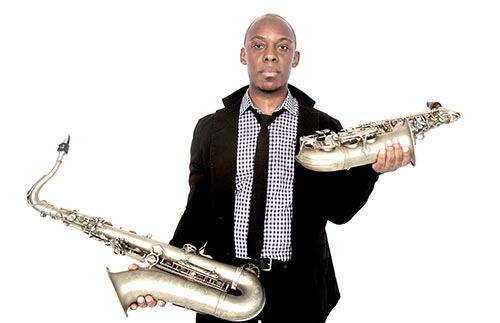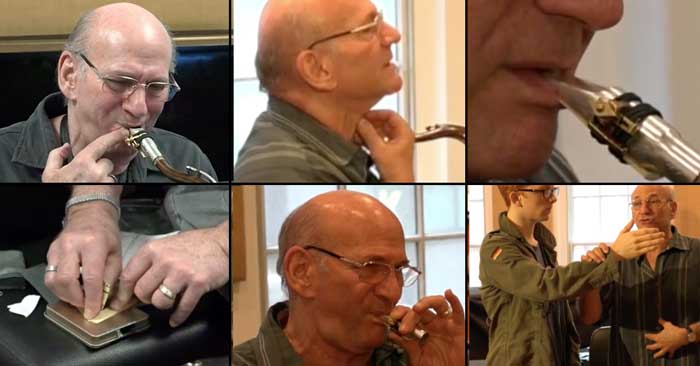Jazz Heavyweight Marcus Strickland on the Hardest Saxophone to Play, and More

Biography
Marcus Strickland (born 1979 in Gainesville, Florida) is a jazz soprano, alto and tenor saxophonist who grew up in Miami, Florida and now currently resides in New York City. Down Beat Magazine’s Critic’s Poll named Marcus ‘Rising Star on Tenor Saxophone’ in ’10 and ‘Rising Star on Soprano Saxophone’ in ’08 and JazzTimes Magazine’s Reader’s Poll named him ‘Best New Artist’ in ’06, Marcus placed third in the 2002 Thelonious Monk International Jazz Saxophone Competition.
Marcus currently has seven releases as a leader: Triumph of the Heavy, Vol 1 & 2 (’11), Idiosyncrasies (’09), Open Reel Deck (’07), & Twi-Life (’06) on his own music label Strick Muzik (launched in 2006); Of Song(’09) on Criss Cross Records; Brotherhood (’02) & At Last (’01) on Fresh Sound Records.
In addition to his own trio and quartet, Marcus currently plays with Dave Douglas, Jeff ‘Tain” Watts, and also had a five-year stint with legendary drummer Roy Haynes. Strickland has been on two Grammy-nominated recordings (Fountain of Youth – Roy Haynes & Keystone – Dave Douglas). He considers his father an early inspiration as he had been a drummer in jazz and rhythm and blues, but is now a lawyer. Marcus’ identical twin brother E.J. Strickland is a drummer, and is currently a member of Marcus’ quartet and leads his own quintet as well.
The Interview
ZS: What made you decide to play the saxophone?
MS:: It was the most different looking of all the instruments introduced in band class, and it being a hybrid of woodwind and brass helped my decision too. What cemented my obsession with it was learning that John Coltrane played the soprano sax on “My Favorite Things”, the recording that got me interested in jazz in the first place.
ZS: What teacher or teachers helped you progress to the saxophonist you are today?
MS:: Steve Kirkland, Dr. Roby George, Whit Sidener, George Garzone, Patience Higgins and Branford Marsalis
ZS: Who do you find yourself listening to these days?
MS:: All sorts of stuff, Thundercat, Flying Lotus, J Dilla, Sonnymoon, Hiatus Kaiyote, D’Angelo, anything cool regardless of genre or instrument.
ZS: What do you find is most difficult when switching from soprano to alto to tenor saxophone?
MS:: First of all, alto is the hardest of them all, might be the shape of the neck that lacks the resistance I am accustomed to on tenor. Soprano is hard to keep in tune, but once you build the chops and posture to have a steady embouchure its cool.
ZS: What practice routine or exercise have you developed to maintain and improve your current musical ability?
MS:: Drones, drones, drones. I tune to them for long periods of time, with large interval leaps and melodic phrases, my tone improves drastically when I manage to consistently do this. Nothing fancy, just the fundamentals, etudes both from myself and other composers.
ZS: For someone who is looking to purchase a professional saxophone, what would you recommend they look for when trying out various models from various manufacturers?
MS:: I like P. Mauriat, they are reasonably priced, they have many bore proportions to choose from, and other options as well.
ZS: What’s the next musical frontier for you?
MS:: Who knows, many times I have tried to predict what will be created next and all that does is make me look like an idiot. LOL I just know it will be open and not limited to one genre, and for the people, that’s where I am at.
Marcus’ Complete Setup
Saxophone
Soprano: P. Mauriat system 76 2nd edition.
Alto: P Mauriat Master 97 un-lacquered.
Tenor: P. Mauriat 66RUL.
Mouthpiece
Soprano: Selmer S-90
Alto: Lebayle Jazz Chamber 7 (wood)
Tenor: Lebayle LRII metal 9*
Reed
Saxophone: Vandoren v-16 3 ½ or Vandoren V-16 3.
Ligature
Ishimori silver ligature for soprano, alto, and tenor saxophone.
Case
Michael Manning double case (tenor/sop), Protec case (alto).
Repair
KB Saxophone Services.
See Marcus in action
To learn more about Marcus go to http://marcusstrickland.com






March 17, 2016 @ 6:46 am
Totally disagree. Alto is a breeze. Order of difficulty- soprano, tenor, bari, alto. A good tenor/alto doubler will have trouble with a soprano’s tendency towards pitchiness and nasal quality. Likewise bari is tough to avoid it’s throatiness and to fill it sufficiently for low notes. I can play alto in my sleep.